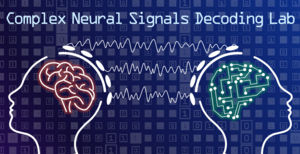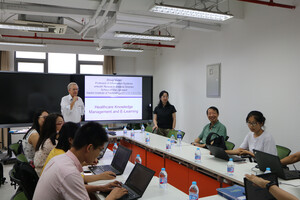Research Labs

Aphasia Research and Therapy
The Aphasia Research and Therapy (ART) Laboratory supports research in (a) Chinese aphasia and rehabilitation, (b) mono-/multi-lingual neurogenic communication disorders in dementia, traumatic brain injury, and right hemisphere damage, (c) discourse-level production in aphasia and its analysis, (d) Intensive Comprehensive Aphasia Program (ICAP), (e) neuromodulation and technology-based intervention of acquired language impairments, (f) normal and aging aspects of language production, and (g) community support to caregivers/families of people with aphasia.
.jpg)
Clinical Hearing Sciences
The research conducted at the Clinical Hearing Sciences (CHearS) Lab focuses on auditory perception issues, in particular reference to the Cantonese and Mandarin speaking population. Their research themes include: outcome measurement with hearing devices and assistive technologies, auditory perception in Chinese and English speakers, effective hearing screening in children and adults, and assessment and treatment of auditory processing disorders.

Complex Neural Signals Decoding
Complex Neural Signals Decoding Lab (CNSD Lab) is a lab with focused research on collecting and analysing the dynamic neural signals associated with various cognitive activities with an overarching aim to understand how the neural signals tell us about the inner workings of the mental system. The lab research methods are primarily based on advanced neural signal processing, analysis, modelling, and deep learning-based decoding of neural spatiotemporal patterns.

Knowledge Management and E-Learning
The Knowledge Management and E-Learning Lab aims to promote research and practice in the area of technology-enhanced leaning and knowledge management, thus enhancing the capabilities of individuals and organisations in such areas.

Science of Happiness and Positive Education
The Science of Happiness and Positive Education (SHAPE) Lab aims to understand the role of well-being factors and interventions in promoting mental health, academic success, and inclusive school settings. Our research concentrates on the application of culturally sensitive positive psychological theories and research findings to address key psychological, educational, and social problems faced by adolescents and young adults, especially in non-Western cultural contexts.

Speech and Music Perception
The Speech and Music Perception Laboratory integrates a research line in speech and music perception, presenting a unique opportunity for interdisciplinary exploration and collaboration. Specifically, the laboratory combines diverse areas of expertise, including speech science, music education, and neuroscience. By leveraging the collective knowledge of these disciplines, the laboratory seeks to advance the theoretical understanding of the shared mechanisms underlying speech and music perception.

Speech and Neuromodulation
Speech and Neuromodulation Lab's research employs behavioural and neuroscientific approaches to study speech-language impediments in both children and adults, with a focus on pinpointing the patterns and underlying mechanisms of neurogenic communication disorders. Aspiring to bolster the effects of behavioural remedies, reduce relapses, and enhance treatment satisfaction, the lab endeavours to explore the use of different neuromodulation techniques as add-ons to available speech therapies.
.jpg)
Speech, Language and Reading
The Speech, Language and Reading Lab’s research involves bilingual children, children with developmental dyslexia, children with autistic spectrum disorders and children with reading comprehension difficulties. It aims to understand specific language and literacy disorders at cognitive, linguistic and social-behavioural levels. In particular, they explore the basic prerequisite skills underlying rapid language and literacy acquisition.
Explore More
_tuned.jpg)
Speech Science
The Speech Science Laboratory supports research in the areas of post-laryngectomy speech rehabilitation, static and dynamic quantification of articulatory behaviour, normal and pathological aspects of voice production, and objective accent measurements.
Swallowing Research

The Swallowing Research Laboratory focuses on comprehensive assessment and treatment for individuals with swallowing difficulties, with the aim of improving their swallowing abilities, quality of life and overall well-being. In order to increase public awareness about dysphagia management and to look for alternatives to treat swallowing difficulties in the elderly, the research team continues to pursue development in dysphagia research.
Voice Research

The Voice Research Laboratory is actively involved in research projects related to voice science and disorders. It also contributes to the clinical services for the community through the HKU Clinical Voice Centre.
